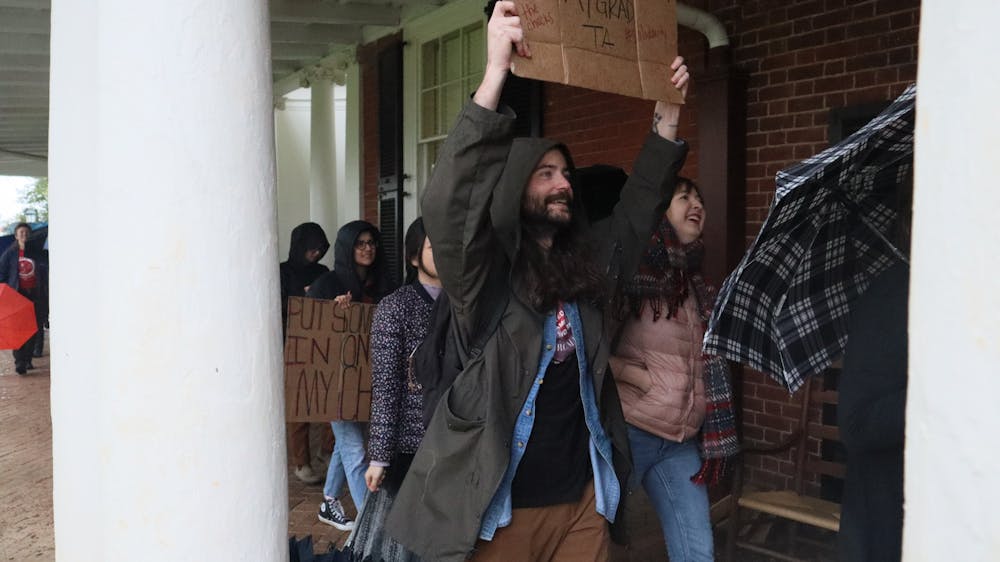Graduate student workers are still facing delayed payments after months of advocacy, according to workers in local union United Campus Workers of Virginia’s U.Va. chapter. Student workers are responding with a Dec. 6 town hall meeting to discuss their response to these late payments and related budget issues.
Several graduate workers first said they had not received timely payments in December 2022 and raised concerns about late payments continuing in the future. Now, although the issue has been rectified for most students, some workers still report stipend delays.
One of these students is Graduate Arts & Sciences student Cleo Boyd, who has faced issues with late payments twice. Initially, she was part of a larger group that received late payment last year.
Boyd said that while she is currently one of the only students she knows facing a delayed payment, the overall process to resolve the issue was not communicated with sufficient clarity or urgency to graduate workers, and issues still remain in resolving the processes.
“It's Wednesday, right? And rent is due on Friday, and I still haven't heard anything,” Boyd said. “The time pressure is acute for me because rent is due in a couple of days, but it doesn't seem there's an understanding of that acute time pressure from people who are working within these appropriate channels.”
In response to the large number of delayed payments last December, Provost Ian Baucom officially convened a taskforce Feb. 9 to investigate and provide recommendations. After the task force's formation, graduate students held a rally in April as graduate students saw continued late payments. The UCW-VA U.Va. chapter then sent two student delegations to meet with Baucom.
The taskforce’s final report, published May 4, included immediate, short, medium and long-term recommendations to make the payments in a more efficient manner. Recommendations included setting up an automatic payment system, modifying Student Financial Services’ emergency loan payment policies and centralizing graduate student financial information into one system.
The University distributes stipends to graduate student workers to cover their living expenses during students’ time with the University, typically paid before the first of each month. Some workers, such as Graduate Arts & Sciences student Olivia Paschal, say this timeline still has not been met despite University assurance that payment delays would not occur again.
“Those [on the delegations] were promised face-to-face that this is the last time this would happen, that they would implement fixes and that people would not get paid late again,” Paschal said. “People have been getting paid late since then.”
According to University spokesperson Bethanie Glover, the University has taken steps in the past year to ensure that payment deadlines are met, issues are quickly resolved and communication is clearer.
“The University is unaware of any systemic delays associated with graduate student stipends and funding,” Glover said in an email statement to The Cavalier Daily. “When isolated issues have occurred, schools and departments have acted quickly to resolve them. Any student who believes that an error has occurred with regard to the payment of stipends or wages is encouraged to reach out to their Director of Graduate Studies and departmental administrators.”
Glover said students received a link to a form made in collaboration with the Graduate School of Arts & Sciences’ student council to track and streamline the resolution of payment issues after concerns were raised. She also said a website outlining the stipend payment process has been added, along with an auditing system to track aid in advance of deadlines.
Despite the University’s efforts, Paschal said communication regarding solutions has been unclear. Both Paschal and Boyd also said low wages for budget administrators themselves likely contribute to delays in the distribution process.
According to the taskforce’s final report, the main reasons for late payments included delays in data approval and miscommunication among administrative staff about payment deadlines. The report acknowledged that issues were exacerbated by temporary vacancies in staff positions that have now allegedly been filled.
According to the UCW-VA website, union members feel the taskforce failed to respect graduate workers as employees.
“The University will say that [graduate students] are apprentices learning how to teach, but we're not learning how to teach, we are teaching,” Paschal said. “And we are doing that in the University. They need us to do that.”
Paschal said these workers are paid at rates below the living wage set by the MIT living wage calendar. Delayed payments may especially adversely affect graduate students in a financially vulnerable position.
“A public institution should serve people regardless of income level, and I think they tend to assume that [graduate students] have access to funds when many don’t,” Paschal said.
Boyd said graduate student workers provide much of the labor needed for the University to function by grading and leading undergraduate courses. At the townhall, she will discuss the experiences of late-paid graduate student workers and the University’s perception of their status as students instead of workers.
The meeting to discuss these issues is open to the public and will be held in the Swanson Room of the Jefferson-Madison Regional Library Dec. 6 at 4 p.m.





